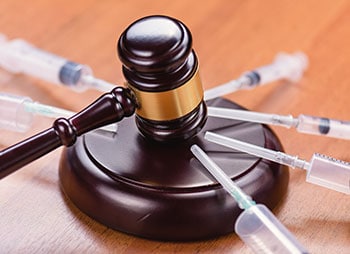
Drug court isn’t for everyone, and it’s important to carefully weigh this option with your attorney. If you have a strong defense, you may prefer to pursue a traditional trial instead. Drug court requires a guilty plea, and while litigation can carry risks, it also offers the opportunity to challenge the charges. Deciding whether to choose drug court depends largely on whether you’re ready to waive your right to a trial in favor of a structured program focused on recovery.
Drug court is a nine-month, structured commitment designed to help participants overcome substance abuse and move forward positively. If your goal is to avoid jail, address addiction, and earn a fresh start, drug court may be an excellent choice. Your attorney can guide you in deciding whether drug court, probation, or traditional court is the best path for your situation.
In this article, you can discover…
Drug Court is a diversionary program that functions more like court-monitored rehabilitation than a formal court that prosecutes. Instead of having motions to suppress and discussions about evidence discovery, drug court moves forward with an assumption that the charges you face are not being disputed.
Instead, the focus of drug court is treating the underlying substance abuse or mental health condition. Drug court usually addresses drug-related crimes such as possession but may also encompass charges like non-violent property crime if an underlying substance abuse problem is involved.
To qualify for drug court, you must have a substance abuse and / or mental health issue, must not have too many past convictions, and must not be facing violent charges or distribution charges. You will also need to plead “guilty” to the charges you face, though these charges can later be dismissed if you successfully complete the program.
A referral for drug court must also come from the District Attorney’s Office. I can help advocate for you to seek that referral and advise you on what steps to take (such as beginning a treatment program) to make that referral more likely.
For one, you are no longer forced to actively fight or disprove your charges. This can make drug court a less stressful process than traditional court. Additionally, if you are in jail before being admitted to drug court, this admission releases you from jail without posting a bond.
An additional benefit is that completion of the drug court program means that your charges will be dismissed. Most drug courts run in the same way and can provide you with an excellent opportunity to get needed help in a structured manner, move forward without a conviction on your record, and turn your life around.

Attorney Greg Webb is a caring, devoted criminal defense lawyer serving Louisiana. For over 15 years, he’s helped clients just like you understand and complete the drug court process and move forward with better prospects and a clean start.
Have questions, or in need of legal guidance? Reach out to the Law Office of Greg Webb at (225) 744-0089 for an initial consultation today.
This depends on where you are starting from. If you are already incarcerated, you may go straight from jail to a rehab facility and, upon release from inpatient treatment, make your first drug court appearance.
If you are not recommended for inpatient treatment, you may make an initial appearance at drug court a little earlier. In either case, this initial process will involve intake into either an outpatient or inpatient treatment program. Your progress will be monitored by the court, and you will be encouraged to stay compliant with the program’s steps and requirements. You’ll be subject to random drug screenings and may be subject to one on the first day.
In every case, the main goal of your first drug court appearance is to make sure that you’re getting oriented into your rehabilitation program. The court will also help you understand the process ahead and determine what kind of treatment will help you succeed.
The drug court program lasts about nine months from start to finish. At the end of the program, there’s a brief period of probation before you are formally discharged.
If you do not complete the program, penalties vary depending on how far into the program you have gotten. If you are expelled from the process very early on along the way without having entered your plea, you are simply discharged back to drug court.
If you had a drug court bond, that bond will be revoked, and you will go back to confinement. From there, your defense attorney will examine your current circumstances and work on the best legal resolution possible in lieu of drug court. This means that you are no longer on the drug court track but are back in the arena of traditional prosecution.
If you have been in drug court for a while, have entered your “guilty” plea, and fail to complete the program, your suspended sentence (including jail time) can now be executed. This means that you will have to face the very penalties you were seeking to avoid by entering drug court.
It’s best to stay in the drug court program, share any concerns or struggles with program managers and your attorney along the way, and work hard to make this second chance stick and be effective.
For more information on What To Expect At Drug Court In Louisiana, an initial consultation is your next best step. Get the information and legal answers you are seeking by calling (225) 744-0089 today.

Attorney Greg Webb is a caring, devoted criminal defense lawyer serving Louisiana. For over 15 years, he’s helped clients just like you understand and complete the drug court process and move forward with better prospects and a clean start.
Have questions, or in need of legal guidance? Reach out to the Law Office of Greg Webb at (225) 744-0089 for an initial consultation today.